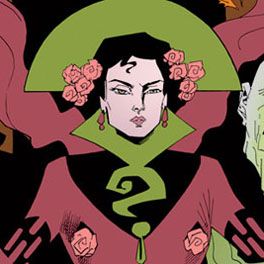The League of Extraordinary Gentlemen Vol III: Century: 1910
by Alan Moore and Kevin O'Neill
Top Shelf, 80 pages, $7.95.
Hey kids! Like Bertolt Brecht? I mean, do you really, really like Bertolt Brecht? As in "I know the entire book and lyrics to Happy End by heart and can recite them at a moment's notice and better stand back because I'm going to do so right now?" 'Cause that's the only way you're going to be able to enjoy Alan Moore's latest comic!
OK, I'm not only exaggerating, I'm being incredibly sarcastic. Still, at the same time there's no question that knowledge of Kurt Weill and Brecht's magnum opus, Threepenny Opera, will aid the reader immensely in understanding and enjoying the latest chapter in Moore and O'Neill's LoEG saga. Whereas previous volumes partly consisted of a who's who guessing game where fictional characters were drawn from a variety of (mostly British) sources, 1910 draws almost entirely upon the German musical. The good news is that it doesn't sink the book, though the uninitiated will definitely feel a palpable sense of being left out of some of the fun.
As we enter the 20th century, we find the League now consists of Mina Harker, a rejuvenated Alan Quatermain, now posing as his own son, the psychic Carnacki, the gentlemen thief Raffles and the immortal gender-bender known as Orlando. A eerie dream of Carnacki's sends the team off to find a mysterious occult group who are trying to create something called a Moonchild. Meanwhile, there's a subplot involving Nemo's daughter Janni who, fed up with her dad, decides to see the sights in London town.
One of the more amusing aspects of the series is how supremely inept the various members can be in moments of dire necessity -- when they're not fighting amongst themselves that is. They were, after all, able to offer next to no aid in defeating the invading Martian army in Vol. II, apart from Hyde's suicidal attack.
That constant subversion of adventure tropes comes to the fore here as the League not only fail to stop the occult group, they inadvertently end up helping them. Indeed their 19th-century brand of heroics seem incredibly at odds with the menacing world taking shape around them. No doubt this theme of Victorian ideals being astoundingly ill-suited for the 20th century horrors will be explored even further in future chapters.
All of this, however, is recounted, commented on and analyzed by a Greek, or, rather, British, chorus of revamped Threepenny Opera cast. Macheath, Suiki Tawdry and a pseudo-Jenny Diver all put in an appearance here, and frequently burst into reworked versions of Mack the Knife, Pirate Jenny and other Opera tunes. Now, music, not to mention poetry, is extremely difficult to pull off well in comics. It's incredibly difficult to have the rhythm of your reading match the intended rhythm of the song, to say nothing of the problem of trying to convey the melody. Moore and O'Neill manage a little better than some -- partly because the songs are well-known, partly because of the pair's skill -- but these sequences fall flat about half the time, since there's no orchestra to back them up.
That being said, Century by and large avoids a lot of the traps that the previous LoEG book, The Black Dossier, walked so blindly into -- namely that the literary appropriations and references take over the work to the point where story and character are lost and confusion reigns. Century suggests a return to the intertwined myth-making that made the first two volumes so much fun, but it definitely feels like the first chapter in an ongoing tale rather than a story that stands on its own two feet, Brecht or no Brecht.

